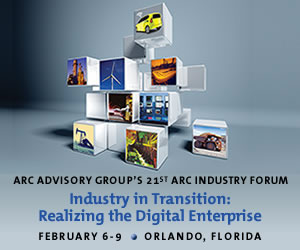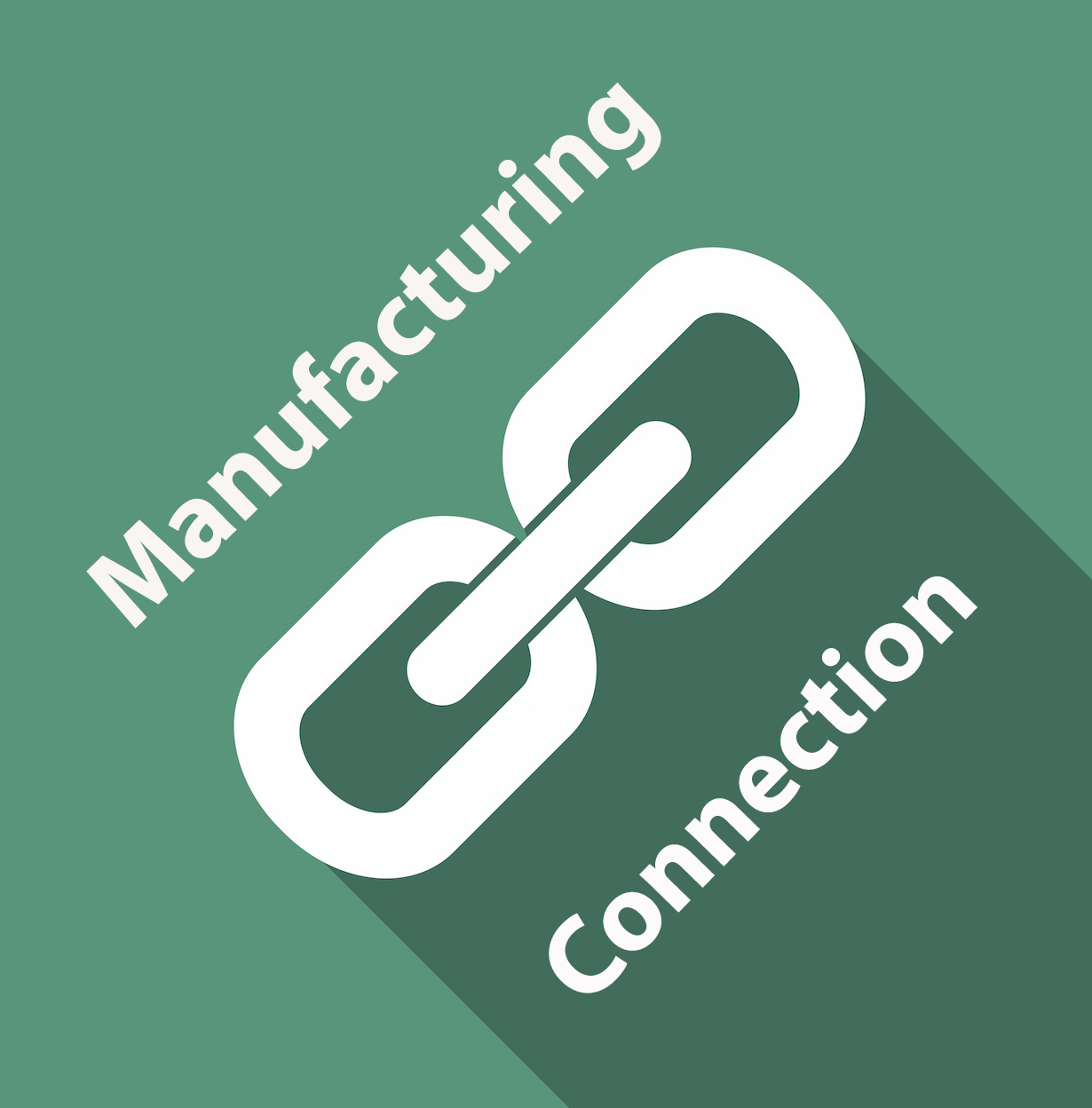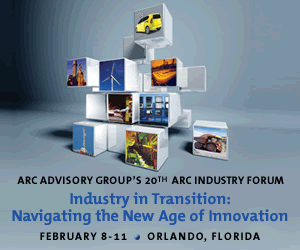
by Gary Mintchell | Jan 10, 2017 | News, Organizations
 There is plenty of time to register for the 21st Annual ARC Industry Forum Industry in Transition: Realizing the Digital Enterprise February 6-9, 2017 – Orlando, Florida. I can’t believe that this will mark my 20th trip to Orlando this time of year.
There is plenty of time to register for the 21st Annual ARC Industry Forum Industry in Transition: Realizing the Digital Enterprise February 6-9, 2017 – Orlando, Florida. I can’t believe that this will mark my 20th trip to Orlando this time of year.
While in many ways this is an ARC Advisory Group “user group” meeting, almost everyone shows up. For several years now this is the one place where you can go and talk with people from many automation suppliers. And with many engineers and managers who implement and manage automation and information.
You can come to make contacts or pick up on the latest trends.
As for me, I will be looking for new companies and products, a sense of the industry’s direction, and contacts who are looking for someone to help them with things I can assist with—strategic messaging, advice on status of industry and companies, product development ideas. It will also be interesting to get an update on the ExxonMobil attempt to commoditize the DCS (I presume so that it can catch up to peers in modernizing operations). That effort has quieted during the past few months.
ARC tries very hard to limit presentations by suppliers. As technology developers, suppliers can be a source of great information. Unfortunately most of the suppliers have used the Forum in the past to simply promote their company and products. No one is paying to attend a forum to hear from marketing managers. Now if a few people from the CTO’s office spoke…
The comments below are taken from the latest ARC promotion. I see only one supplier listed in the speaker lineup so far.
Industrial companies are starting to employ ‘digitalized’ business processes and exploit the increasing convergence between operational technology (OT), information technology (IT), and engineering technology (ET) on the plant floor. How will disruptive technologies change existing products and plants? How will open source solutions impact traditional software and automation domains? Is cybersecurity a threat to digitalization? How ‘smart’ are smart machines? How do Big Data and predictive and prescriptive analytics enable operational change?
Join us to learn how the digital enterprise benefits from smarter products, new service and operating models, new production techniques, and new approaches to design and sourcing.
Check out these topics:
- Industrial Cybersecurity and Safety Analytics and Machine Learning
- Asset Performance Management
- IT/OT/ET Convergence
- Service Performance Management
- Automation Innovations
- Industrial Internet Platforms
- Connected Smart Machines
Partial List of Executive Speakers:
- S. Dept. of Homeland Security, Marty Edwards, Director ICS Cyber Emergency Response Team
- ExxonMobil Research & Engineering, Don Bartusiak, Chief Engineer, Process Control
- NOVA Chemicals, Doug Lutz, Principal Process Automation Engineer
- Savannah River Nuclear Solutions, Laura Sheets, Tritium Process Control Lead Engineer
- Local Motors, Justin Fishkin, Chief Strategy Officer
- NIST, Adam Sedgewick, Sr. Information Technology Policy Advisor
- Duke Energy, David Lawrence, Technology Development Manager, Emerging Technology
- Merck, Gene Tung, Director of IT
- WAGO, Thomas Holm, Head Innovation & Technology
- Eli Lilly, Kevin Wilhelm, Senior Consultant
- Ascend Performance Materials, Terry Unruh, Maintenance Process Leader
- Kinder Morgan, Lawrence Staab, Training Coordinator/Instructional Designer
- Georgia-Pacific, Michael Carroll, VP Innovation and Operations Excellence
- 3M, Liu Qiao, Technical Director, Software Electronics Mechanical Systems Lab
- Dow Chemical, Glen Mutscher, Global Director, Manufacturing & Engineering
- ExxonMobil Research & Engineering, Steve Bitar, R&D Program Manager
- American Society of Mechanical Engineers, Dean Bartles, Sr. Technology Advisor
- Dow Chemical, Mary Beth Seasholtz, Data Services Technical Leader
- Fluor, David Hoeppner, David Hoeppner
- Shell Global Solutions, Tyler Williams, Global Technology Leader
- Massachusetts Institute of Technology, Stuart Madnick, Professor of Information Technologies and Engineering Systems
- Albermarle, Jonathan Alexander, Operations Engineer
- AGCO, Jan Theissen, Director Strategy & Methods, Global Purchasing & Materials
- Pepsi Beverages, Jeff Russell, SE Regional Engineering Manager

by Gary Mintchell | May 27, 2016 | Automation, News
 The 2016 edition of Schneider Electric’s Foxboro/Triconex/Modicon user group meeting attracted a fair number of people. This is amazing given that advanced notice wasn’t very advanced.
The 2016 edition of Schneider Electric’s Foxboro/Triconex/Modicon user group meeting attracted a fair number of people. This is amazing given that advanced notice wasn’t very advanced.
It’s always great catching up with some of the industry’s thought leaders, as well as getting a glimpse of new and coming products. Among the themes that came across strongly included “security by design” and focus on customer’s assets not just control and automation.
The acquisition has turned out pretty much as I thought it would. Schneider Electric has brought financial stability and investment in research and development. Organization stability is getting there, but people are still moving around a little. The only surprise I had was Schneider’s view of software. I figured that since Schneider Electric had very little history with software that it might shop the division. In fact, the Aveva reverse acquisition (or whatever) seemed to prove the point. Yet, hallway conversations universally pointed to a different reality. Schneider senior management sees great possibility for its new software assets. Since one of its competitors just renamed its upcoming event by removing the word “software”, I find this a significant competitive move.
Different Project Ideas
In an interesting twist, the opening keynote was given by a customer—Sandy Vasser of ExxonMobil. Vasser had presented his vision at the ARC Forum in Orlando in February, so I had an idea what was coming—a challenge to Schneider Electric, and indeed all suppliers. The oil & gas industry faces many challenges and it is time to think differently about traditional automation practices and technologies. The key is lowering the cost of projects and time to first oil.

A new approach is required:
Reduce customization
- push customization to the software, use standard hardware
- eliminate the need for project specifications
- eliminate the need for the infrstructure to support customized solutions
Reduce complexity simplify designs
- reduce the component count and the number of divergent systems
- take full advantage of the capability of the installed systems
- reduce the number and simplify interfaces
Eliminate simplify or automate processes
Mitigate the effects of dependencies
Reduce the amount of automatically generate documentation
Take managed risks accept some compromises
Develop and enable trust with our suppliers and our contractors
Key enablers:
- Smart configurable I/O in standard field junction boxes
- Virtualization (runtime and engineering) completely separate hardware so can test software without hardware
- Customization pushed from hardware to software
- Autodetect/Autointerrogate/Autoconfigure/Autoenable/Autodocument I/O
New challenges for our key suppliers
- control systems age in place
- system architectures made simple
- systems consist of building blocks that can be easily upgraded to current technologies
- upgrades or repairs will not be intrusive, disruptive, or unnecessarily costly
- rip and replace will never be necessary
- control system selection for a facility will be for life; fully supported and sustained
We have heard Vasser’s challenge before. But this reinforcement shows how serious ExxonMobil is about moving project planning and implementation to a new level. Faster time to start up and greatly reduced cost. The challenge for suppliers such as Schneider Electric is to bring what the customer wants and still make money. If the customer drives the supplier to a point where profits are just not there, then innovation will cease. But a good challenge from a supplier can spur innovation. We’ll see.

by Gary Mintchell | Feb 11, 2016 | Automation, Operations Management, Process Control, Standards
The undercurrent talk of the ARC Advisory Group Industry Forum this week in Orlando was how ARC’s Andy Chatha promoted the ExxonMobil/Lockheed Martin initiative to develop a new type of distributed control system.
I have to dash this initial thought off since I have about 20 minutes to get to my plane home. My week has been non-stop meetings from 7 am until at least 11 pm all week. This morning was a bit of a breather. Lots of stuff going on.
However, the ExxonMobil initiative provoked much discussion, rumors, speculation, whatever.
Part of the problem is that the program has just been announced and therefore is not defined.
The basic problem seems to be that Exxon is operating with very old DCS technology and has a great need to upgrade. But “ripping and replacing” would be very expensive. From conversations that I can report without naming names, I gather that they are looking for a software-defined distributed control residing above the current hardware control layer. The further wish is that the hardware layer would include parts interchangeable from supplier to supplier.
It hopes that this would be an industry-wide consortium that would drive standards for the software and the hardware. It has requested cooperation from technology suppliers as well as its peers in the oil & gas industry.
There are pieces of this that look very interesting. And, of course pieces that stand probably the proverbial snowball’s chance.
“Software defined” is of course developing in several industries (think Ethernet switches?).
My experience is that this sort of industry-wide standards development takes so much time that the technology it envisions is obsolete.
I’ll have more later after giving the idea more thought.
Meanwhile, I have announcements from Inductive Automation, Honeywell, Bentley Systems, Yokogawa, ABB, Bedrock Automation, and more coming tomorrow when I get a chance to think and write.

by Gary Mintchell | Jan 13, 2016 | Automation, Events, News, Operations Management
 We are closing in on February and time to start thinking about the ARC Industry Forum in Orlando. I went to my first one in 1998 and have my airline and hotel reservations for this edition.
We are closing in on February and time to start thinking about the ARC Industry Forum in Orlando. I went to my first one in 1998 and have my airline and hotel reservations for this edition.
Given the demise of general industry trade shows, there are precious few opportunities to see a large cross section of the automation and control industry. This is one.
I have 2 or 3 appointments set. If you are there, ping me. Maybe we can do a “meet up” in the lounge before everyone splits for dinner or something. Or stop me to chat during the week. ARC has once again planned an afternoon of press conferences for its sponsors. I’ll arrive in time to listen if you are presenting.
The 20th Annual ARC Industry Forum has the theme, “Industry in Transition: Navigating the New Age of Innovation”.
The conference is February 8-11, 2016 at the Renaissance Sea World in Orlando, Florida.
ARC says, “New information technologies such as Industrial Internet of Things (IIoT), Smart Manufacturing, Industrie 4.0, Digitization, and Connected Enterprise are ushering in a new age of innovation. These concepts are clearly moving past the hype, where real solutions are emerging backed by strong business cases. Expect to see innovations in smarter products, new service and operating models, new production techniques, and new approaches to design and sourcing. Join us to learn how this industrial transformation will unfold and what other companies are doing today to embrace innovation and improve their business performance.”
Questions they expect to address:
- How will inexpensive, easy-to-install sensors change existing products and plants?
- Will cyber security concerns impede disruptive innovation?
- What kind of intelligence will machines have and what value will this bring?
- What role will Wi-Fi and LTE play?
- How do Big Data and predictive and prescriptive analytics enable operational change?
- What is the opportunity in aftermarket services?
- What software capabilities are needed to achieve transformational change?
- Which industries are already changing?
- What steps can organizations take to foster innovative thinking?
Forum’s Keynote Presentations
Michael Carroll, Vice President, Innovation & Operations Excellence, Georgia-Pacific
Michael joined Georgia-Pacific in 2010 to focus his technological and entrepreneurial talents on innovation and leadership. Prior to that he and a partner formed McTech Group, a company focused on innovative products for the building products and construction industry. In addition to his Executive Vice President responsibilities, Michael formed a Joint Venture designed to sell consumer “DIY” products to big box retailers like Wal-Mart, Home Depot, and Lowe’s. Previous positions include Director of Operations at Riverwood International, CEO of North and South American Operations at Shepherd, and Principal Change Agent at Mead Paper.
Sandy Vasser, Facilities I&E Manager, ExxonMobil Development
Sandy has been with Exxon or ExxonMobil for over 35 years and has been involved in a number of Upstream projects covering offshore facilities, onshore facilities, and cogeneration facilities. He currently manages a team of about 120 electrical and I&C professionals responsible for the design, installation, and commissioning of electrical generation and distribution systems, process control systems, and safety instrumented systems for all major ExxonMobil Upstream capital projects. This team is also responsible for developing, promoting and implementing strategies, practices, processes, and tools for successfully executing project automation and electrical activities.
Rob High, Vice President and Chief Technology Officer, Watson Solutions, IBM Software Group
Rob has overall responsibility to drive Watson Solutions technical strategy and thought leadership. He works collaboratively with the Watson engineering, research, and development teams across IBM. Prior to joining Watson Solutions, Rob was Chief Architect for the SOA Foundation and member of the IBM Academy of Technology. He championed an open industry architectural definition of the principles of business and IT alignment enabled by SOA and business process optimization, as well as ensuring IBM’s software and services portfolio is architecturally grounded to enable for efficient SOA-based solutions. Rob has 37 years of programming experience and has worked with distributed, object-oriented, component-based transaction monitors for the last 26 years.

 There is plenty of time to register for the 21st Annual ARC Industry Forum Industry in Transition: Realizing the Digital Enterprise February 6-9, 2017 – Orlando, Florida. I can’t believe that this will mark my 20th trip to Orlando this time of year.
There is plenty of time to register for the 21st Annual ARC Industry Forum Industry in Transition: Realizing the Digital Enterprise February 6-9, 2017 – Orlando, Florida. I can’t believe that this will mark my 20th trip to Orlando this time of year.

 The 2016 edition of Schneider Electric’s Foxboro/Triconex/Modicon user group meeting attracted a fair number of people. This is amazing given that advanced notice wasn’t very advanced.
The 2016 edition of Schneider Electric’s Foxboro/Triconex/Modicon user group meeting attracted a fair number of people. This is amazing given that advanced notice wasn’t very advanced.


 We are closing in on February and time to start thinking about the
We are closing in on February and time to start thinking about the 



